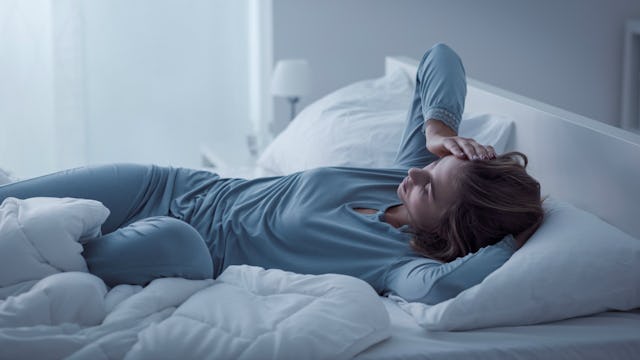How Mental Illness Can Impact Sleep Habits

I can’t recall ever sleeping through the night. Never. Not once. And I’m 36 years old.
Now keep in mind that I’m a father of three. Having a booger-nosed little one come in my room asking for water or to tell me they lost a blanket isn’t unusual. But on the nights I’m not disturbed by my children, I’m still up, stewing about this or that from work, or my kids, or who knows what.
Sometimes I’m up thinking about something stupid I did 10 years ago that doesn’t matter anymore and no one remembers but me, and yet, there I am, replaying it like a flickering film on the ceiling. Just last week, I was up for two hours thinking about the time I dropped the F-word in my high school English class. The teacher has been dead for a few years now, and there I was, up in the night, wishing I could apologize.
I get up early for work, and on the weekends I sleep too late trying to make up for all those long nights. All of this apparently exacerbates my depression and anxiety.
Those of you without mental illness probably just want me to put it to the side and not worry about it. Go to sleep. Or at least, that’s what my wife thinks I should do. She doesn’t have these problems. She sleeps like a rock. But if you are struggling with depression and anxiety, this is the reality.
It’s miserable. And to make it all worse, if you do much research on the subject of sleeplessness and mental illness, it’s more or less a chicken or the egg kind of situation. It’s never been confirmed if sleeplessness causes depression, or if depression causes the sleeplessness. But in any event, it’s a never-ending cycle.
However, science (I love you, science) has come one step closer to figuring out what’s going on in the brains of those struggling with mental illness and sleeplessness. Researchers at the University of Warwick in the UK and Fudan University in China have pinned down the part of your brain that keeps depressed and anxious people up at night. How cool is that?
So here’s what they did. In a study published in JAMA Psychiatry, researchers looked at data from just over 1,000 participants. Some had symptoms of depression, some didn’t. In the brains of people with depression, the researchers found “a strong connection between the dorsolateral prefrontal cortex (associated with short-term memory), the precuneus (associated with the self) and the lateral orbitofrontal cortex (associated with negative emotion).”
Now check it out: if I were to try and point to this section of the brain, I couldn’t. I’m sorry. Perhaps you can, but I can’t. I also can’t point to Uruguay on a map, so let’s move on. But the exciting part of all of this is that doctors have found that there is, in fact, something going on in the brain when people with depression or anxiety can’t sleep. So when someone says, “it’s all in your head,” they are actually correct. It is, and it’s real, and they need to shut their face because mental illness is as real as any other medical condition.
I don’t want to speak for everyone who is dealing with mental illness, but I can say that any way we can get it further validated and normalized is huge. I have been carrying around the stigma of “you just need to get over it” for decades, trying to figure out why I can’t just get over it when others can.
But I’m not the one who needs to “get over it,” society needs to get over it’s outdated ideas about mental illness. We need to get over assumptions that depression and anxiety aren’t “real” medical conditions, so those of us with depression and anxiety can stop feeling depressed about how no one accepts our condition. Okay… rant over.
But the second really exciting part about this is study is now that doctors know where to pinpoint the problem, they can start to find a solution. And doesn’t that sound wonderful? Feng, Ph.D., a researcher on the study from the University of Warwick said that this study will help the medical community better focus on a specific part of the brain when developing new treatments.
Naturally this is all going to take years. So in the meantime, if you are like me, and you are struggling with depression and anxiety, and you can’t sleep, here are some tips.
Dr. Ariella Silver, Psy.D., of the Mount Sinai Adolescent Health Center, told Elite Daily that, “It’s really important to employ good sleep hygiene.” She recommends going to sleep at the same time, and getting up at the same time. I know, with kids this can feel like an impossible task, but it is doable.
She also suggests creating a sleep routine, which could include “wind-down” self-care activities like reading, diffusing calming essential oils (did you read that, Oil Enthusiast?!) in your bedroom, or even sitting silently as you focus on relaxing breathing techniques. I use a meditation app called Headspace that really helps me wind down. She also recommends writing down all those worries before you go to bed as a way to get them out of your head so you can focus on sleep.
Living with sleeplessness sucks. Living with depression and anxiety sucks, too. Having them all in one package can lead to serious problems. So having the medical community focus on the intersection of all these issues and find ways that validate the condition and advance treatment options is essential.
If you or someone you know needs help, visit the National Suicide Prevention Lifeline or contact Crisis Text Line by texting “START” to 741-741.
This article was originally published on